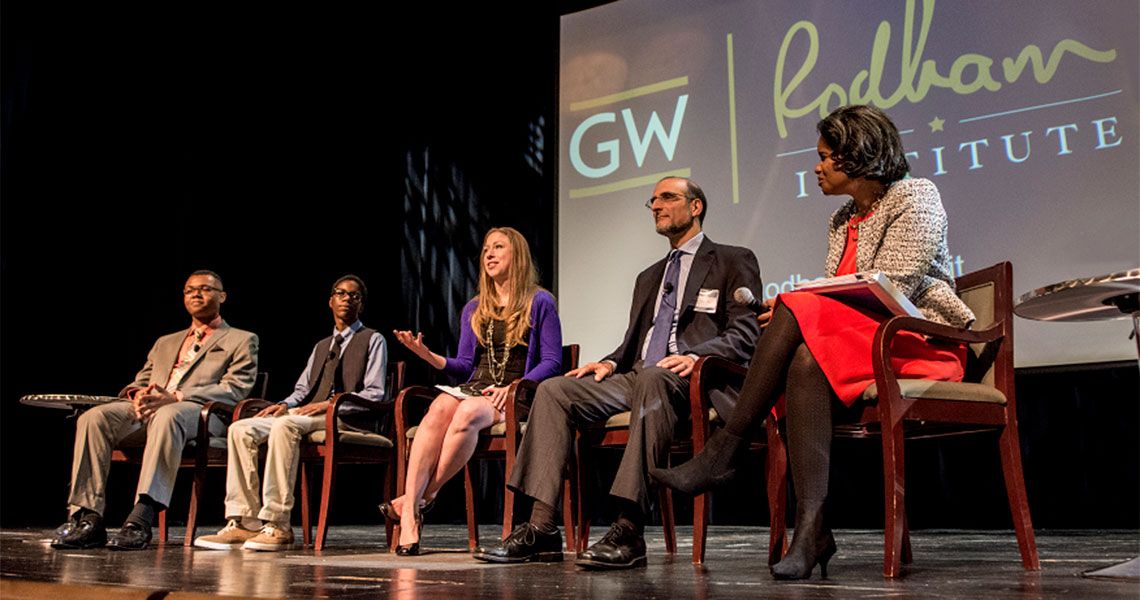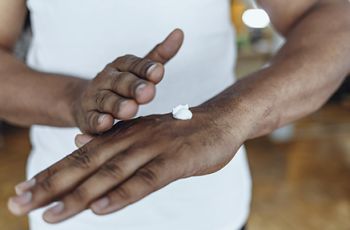Health equity in Washington, D.C., the home of some of the country’s most impoverished and underserved, is a pervasive theme across discussions between health care workers and advocates. That on-going dialogue continued during the third annual Rodham Institute Summit, held Oct. 2 at THEARC in southeast D.C. The event featured panels of health care and health policy experts discussing topics such as childhood obesity, access to mental health care and the importance of community health partnerships, but it was the first-person narratives of those dealing with these challenges that made the topics more tangible.
“If you really understand the context,” began sixth-generation Washingtonian Marcus Andrews at the “Addressing Childhood Obesity”-focused panel, “it caused my weight to spiral out of control.”
Andrews, whose family enrolled him in academic courses and church activities to keep him safe from crime, was powerless to the corner store near his grandmother’s home. The four-for-$1 chips, $2 pizzas and Little Debbie’s snack cakes quickly took their toll, and by the time Andrews was 16 — and a college student at the George Washington University (GW) — he was placed under medical supervision. With the help of his adviser, “I was able to lose over 100 pounds,” he said, as the summit audience of community stakeholders applauded. “Ultimately, I want to take my life experiences and my academics … and go back to communities that are disadvantaged, like mine, to really work with the community on designing and implementing culturally sensitive health initiatives.”
For panel members Chelsea Clinton, vice chair of the Clinton Foundation, and Howell Wechsler, chief executive officer of the Alliance for a Healthier Generation, Andrews’ story exemplifies an ongoing movement toward healthier lives.
“We need to have a sense of urgency,” Ms. Clinton said. “We deserve to have different options, healthier options and healthier pathways.”
Ms. Clinton and Dr. Wechsler cited advancements in partnerships, particularly with food and beverage corporations, in steering standards in a healthier, more beneficial direction. The Alliance has worked to improve the quality of food and physical education in schools and is now emphasizing the education of parents and teachers on healthy habits. It’s a route that Ms. Clinton believes her grandmother, Dorothy Rodham, would approve.
“The work of the Rodham Institute closely aligns with my grandmother’s belief in the transformative power of education to achieve social change,” she said.
The Rodham Institute, which was established in 2013 in honor of the late Ms. Rodham, uses education to achieve health equity in Washington, D.C. and partners with the community to cultivate the next generation of health care providers.
“I’m just so grateful that the work that the Rodham Institute and GW are doing now is in the same line that everyone should be able to determine their own paths, and that so often things like childhood obesity really are questions of social justice and equity,” Ms. Clinton said.
In an earlier panel on mental health care in the District, personal stories again cut through to the heart of the issue. Between tears and hugs, mental health advocates Kristi Coles and Melinda Hasbrouck related their struggles and successes. Ms. Coles was attending a bachelorette party when her friend was shot; the bullet traveled through his neck and caught Ms. Coles’ earring. “I think I just went into shock right then and there,” she said. Ms. Coles battled with trauma, until a breakdown ultimately drove her to the hospital in 2010. Ms. Hasbrouck, meanwhile, suffered from mental illnesses, including bipolar disorder and suicidal tendencies, during law school. After a couple of suicide attempts, she sought help from her law school’s counseling center, in addition to other programs. Both Ms. Coles and Ms. Hasbrouck, who is now the executive director of Our Door, believe access to mental health — and reducing social stigma — is critical.
It’s a stance that Former Senator Chris Dodd, who spoke during the Summit’s luncheon, supports. “There are few issues that touch the lives of people more than mental illness,” he said. The Rodham Institute, he added, has helped, both with mental health and other illnesses affecting the community. “What they do at the institute is making an important difference, every single day.”
The institute, which is housed within the GW School of Medicine and Health Sciences and supported by the GW Medical Faculty Associates, has partnered with several organizations, many of whom presented on successful outreach programs during the Summit. Additional posters on research projects, including those from the Institute’s Health Education and Leadership Programs, a comprehensive pipeline program designed to cultivate student interest in diverse health professions among underrepresented minority youth, were also included in the presentation line-up.
In encouraging partnerships, Jehan “Gigi” El-Bayoumi, M.D., RESD ’88, founding director of the institute and professor of medicine at SMHS, awarded three small grants, totaling $35,000, to collaborative projects.
“This summit was not only about celebrating the great work that's being done every day by silent heroes in our community that lifts people so that they can be healthier and able to lead happier lives. It's also about sharing and exchanging experiences and maximizing the collective work being done to improve our city's health,” Dr. El-Bayoumi said. “To hear about individual stories of people who have transcended incredible hardships and to learn about how various organizations address issues from food insecurity to mental health or HIV was truly inspiring.”



